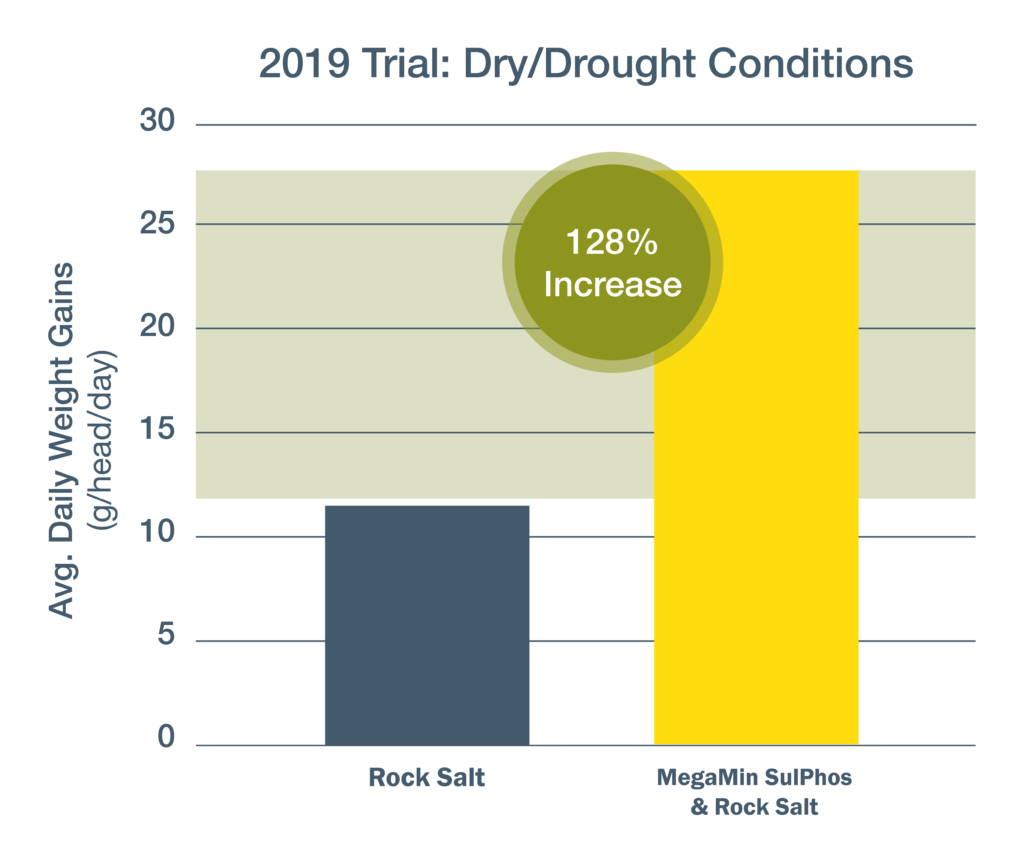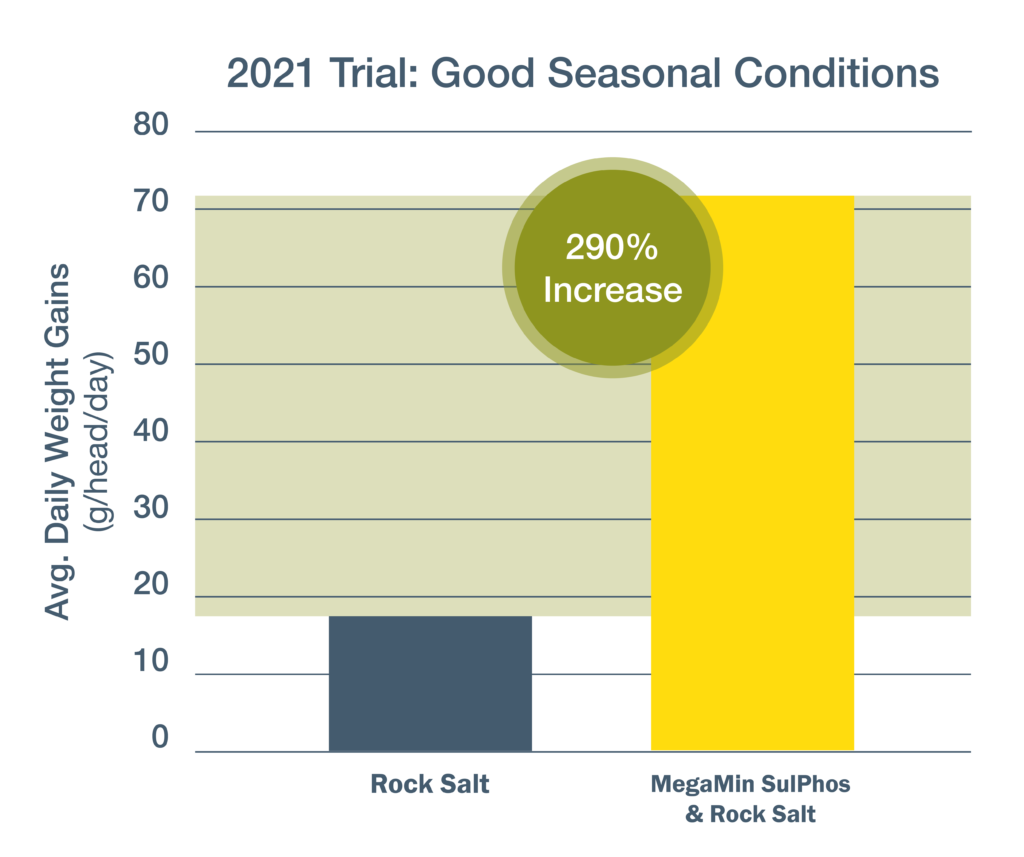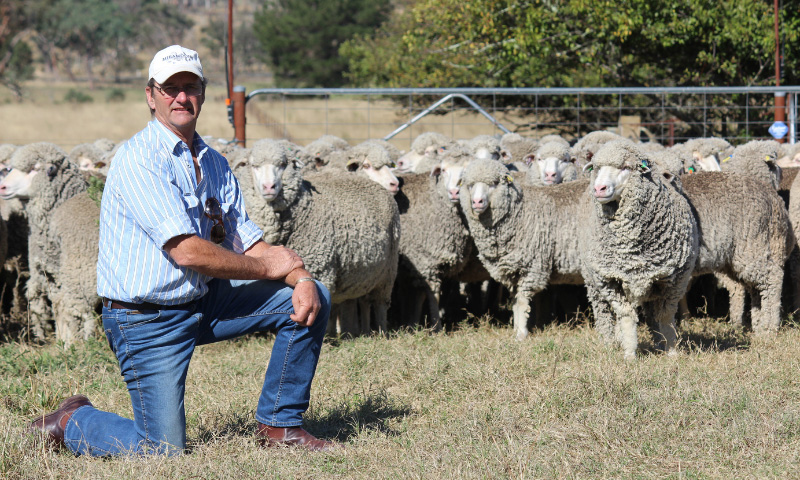Minerals fill the nutritional gap for soil and stock at Miramoona Merinos
Product Range: MegaMin SulPhos, MegaMin Extra Sulphur, NatraMin Original Blend and NatraMin Cal-S
Region: Walcha, NSW
- Extra Sulphur benefits for wool growth and parasite control
- Increased growth and improved wool quality
- Increased weight gains
- Ability to withstand drought conditions
The Barnets run 7500 stud and commercial Merinos along with 200 Angus breeders plus progeny near Walcha, NSW. Kim Barnet has used MegaMin Extra Sulphur to supplement his ‘Miramoona Merinos’ for over 8 years now. “We wanted to get away from urea and to find a more natural type of product to deliver minerals to our stock. We don’t fertilise on an annual basis so we use MegaMin to keep the minerals up to our stock.” Intake fluctuates dramatically at Walcha depending on the paddock, parasite burdens, dry times or green feed. Kim’s young sheep provide the best indication of paddock mineral requirements.
When Barber’s pole worms are prevalent, MegaMin intake noticeably increases and Kim has also noticed that weaners take to the minerals sooner if previously supplemented while still on the ewes. When grain feeding, sheep really look for the minerals to buffer the rumen.
We find the MegaMin Loose Supplement is easy to use because it is safe if it gets wet and it works well for our rotational grazing management. Since wool is our major income, Extra Sulphur provides the benefits for wool production and Sulphur also aids in parasite control. At certain times the sheep really chase minerals and a loose supplement allows for quick intake. Rock salt is put out with the MegaMin to keep salt cravings satisfied and to regulate intake.”
Soil and pasture improvement
“Despite applying potash and lime to our back country and despite using other licks, our stock still had noticeable deficiencies and lack of growth. In recent years NatraMin has been broadcast and this has definitely changed those paddocks. Stock do a lot better and the pasture density seems to have improved,” said Kim.
The results are certainly evident in the brightness of the wool, particularly with reduced ‘creaminess’ in hogget wool. Miramoona Merinos are noted for being large framed New England sheep, with 50-60kg ewes. The Barnets utilise outside genetics with a flock average of 4.5- 5kg of 17.5 micron wool. Rams are sold in February at Armidale ‘unhoused’ ram sales or on property throughout the year.
It is a common challenge among Merino wool producers in the New England Region, is to get their weaners to grow out and realise their genetic potential.
Most of the Merino sheep in this area are grazed on lighter granite soils known for limiting nutrients, in particular sulphur and phosphorus. Recent trials by AgSolutions’ Philip Stacy and Miramoona Merinos producer, Kim Barnet, sought to determine the extra growth potential for Merino weaners by supplementing with extra phosphorus and sulphur.
Why do these nutrients play such an important role in sheep and wool production?
A sufficient level of sulphur is crucial for wool production, as wool fibres are primarily made of the protein, keratin. Keratin contains a significant amount of the sulphur-containing amino acid cystine. Sulphur represents approximately 4% of wool’s composition.
Sulphur is essential for rumen health and the formation of amino acids. It is a key mineral for wool growth and assists in parasite control. Sulphur also helps to detoxify prussic acid to enhance production from sorghum crops. With adequate sulphur intake, stock are able to graze more stalk and stem resulting in better utilisation of the plant and subsequent growth.
Providing adequate levels of phosphorus is also key to improving the overall performance of your flock. Sufficient levels of phosphorus are vital for growth, bone and muscle development, milk production and fertility.
MegaMin SulPhos and Rock Salt Merino Weaner Trials
On the recommendation from local field advisor – Phillip Stacy, Kim introduced MegaMin Sulphur Supplements to their Merinos to assist mineral balance, wool growth and production.
To measure phosphorus and sulphur supplementation effects on Merino weaners, two trials were conducted over a two month period, during dry/drought conditions (2019) and in good seasonal conditions (2021) in order to provide a good comparison.
The Merino weaners were drafted into a supplemented group and controlled group to compare daily weight gains during both trial periods. The supplemented groups received MegaMin SulPhos and rock salt, and the controlled groups only received rock salt only.
During the drought conditions, the sheep supplemented with MegaMin SulPhos had a higher average daily weight gain of 28.57 g/head/day compared to the controlled group which produced of 12.5 g/head/day. There was a significantly greater average daily weight gain achieved during the good season for weaners receiving the MegaMin SulPhos of 71.57 g/head/day, compared to the controlled group that did not receive the supplement, averaged at 18.33 g/head/day.


Kim Barnet further acknowledges the benefits of using MegaMin livestock supplements, stating “MegaMin is easy to use because it’s safe when wet and works well for rotational grazing management. As wool is one of our major incomes, we’ll keep using MegaMin SulPhos in future as sulphur aids in parasite control and increases wool production.”
Increasing daily weight gains in Merino sheep can increase body size and subsequent wool production, meaning overall flock production will likely improve where stock are encouraged to reach their full genetical potential with an annual supplement program.
To find out more about Kim Barnett’s story watch the video below
